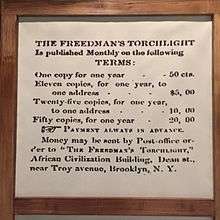African Civilization Society
The African Civilization Society was an emigration organization founded by several prominent members of the historic Weeksville community located in central Brooklyn during the mid 1800s.[1]

History
Founded in 1858 the organization's intent was to promote emigration to Liberia and create a competing "free-labor" cotton industry that would compete with the slavery based cotton industries of the United States of America, prompted by the hypocritical political notions of the Supreme Court's Dred Scott decision that automatically disenfranchised many tax paying, landowning, and successfully enterprising black and African American professionals.
Similar to the Emigration to Africa philosophies of 17th Century groups such as the American Colonization Society, the African Civilization Society was founded and lead exclusively by blacks or African Americans.
Leadership
"The Society is composed of ministers and gentlemen of known and tried integrity..." including Henry Highland Garnet, Martin Delaney, Junius C. Morel, Rev. R. H. Cain, Rev. A. A. Constantine, Robert Campbell, Theodore Cuyler (European American), George W. LeVere, James Myres, James Morris Williams, Peter Williams, Rev. Amos N. Freeman, Rufus L. Perry, John Sella Martin, Henry H. Wilson and many others. Fredrick Douglass was a strong opponent of colonization, however he was known to have a very integrated relationship with several members of the society.
"Self-Reliance and Self-Government on the Principle of an African Nationality..." featured as a founding value statement included in the original constitution. Following the Civil War, the mission of the organization shifted to providing basic needs to freed people, especially in the form of establishing schools and sending some 129 teachers throughout the South.
Publications
The institution was also known for printing two publications that circulated among communities of black and African Americans, a monthly called the Freedman's Torchlight and a weekly called the People's Journal.[2]
References
| Wikimedia Commons has media related to The Freedman's Torchlight. |
- ↑ Wellman, Judith (2014-01-01). Brooklyn's promised land: the free black community of Weeksville, New York. ISBN 9780814725283.
- ↑ "THE AFRICAN CIVILIZATION SOCIETY.; Response to its Opponents No Connection with the Colonization Society.". The New York Times. 1860-05-16. ISSN 0362-4331. Retrieved 2016-03-05.